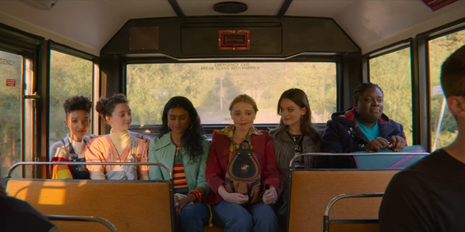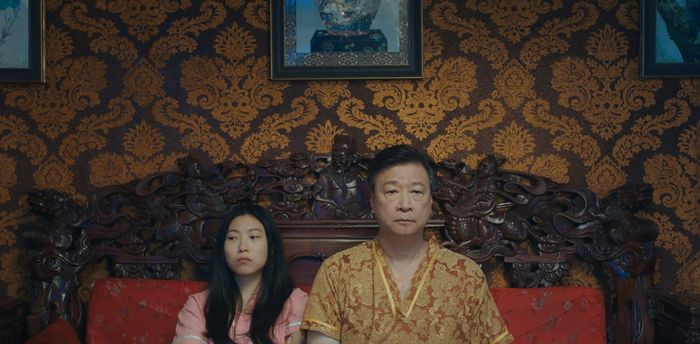Put Sex Education back on your timetable
The second season of Netflix’s 2019 teen leviathan only builds on the impressive first, finds Gabriel Humphreys

Content Note: This article includes discussion of sexual assault and brief mention of self harm.
Following hot on the heels of an engrossing and hugely successful first series last year, Netflix’s Sex Education is back for a second, continuing the story of Otis and his makeshift secondary school sex therapy clinic as he enters a new academic year.
Having adored the first season, I was healthily skeptical about this one, especially considering the speed of its release: it felt like a potential Netflix cash grab, and the accompanying Chromebook and Now TV adverts starring members of the cast and filled with dodgy innuendo didn’t help to shake that feeling.
Honestly, to begin with I was rather disappointed. The first episode or so had brought me back into the diverse and wonderfully woven-together narrative structure of the first season, but things slowed down as soon as Maeve returned to the school and it felt like we were just going to be re-hashing season one with slightly altered interpersonal relationships.
Yet the show quickly sways from its episodic structure and finds a new rhythm: as Jean’s presence in school truncates Otis’ business, the series finds a new macrostructure, one that allows for rich and nuanced character development that I didn’t even know we were missing until now.
“a blended aesthetic that is at once unplaceable and unmistakable”
Netflix’s impressive star-pulling power continues to be one of its most valuable features, and the series only builds on the impressive ensemble cast of the first season, with excellent additions including Chinenye Ezeudu as Viv and the brilliant T’Nia Miller as chair of the school board. Continuing from last season, Gillian Anderson is a standout as Jean, given more screen time as she wrestles with romance and domestic intimacy in an internal conflict laced with the trappings of a mistrust that runs convincingly deep. Ncuti Gatwa’s Eric matures too - I felt in the first season he was a little too much ‘Otis’s sidekick’, but in the second installment his character arc is fully fleshed out. Gatwa’s performance is given the ebbs and flows it needs to shine even brighter.
Sex Education is often a show of troubled – even tortured – characters, and individual performances carve out their own valuable glints of tragedy amid a sea of comedy. Emma Mackey as Maeve and Anne-Marie Duff as her mother, Erin, are a formidable duo, and their game of emotional cat-and-mouse, trust and betrayal is both poignant and heartbreaking to watch. More serious topics also find space for discussion – stress-induced self harm, addiction, and, most notably, sexual harassment and assault. The latter topic is treated with admirable sensitivity and realism in the show’s depiction of the slow-burning weight of trauma, and makes for some of the most powerful moments of all eight episodes.
The show remains one of the most visually compelling series going, with a bizarre 80’s/modern-day blended aesthetic that is at once unplaceable and unmistakable, all set against swelling valley panoramas and lush forests. I think camera work can be easy to forget in television, but I’ve always found that Sex Education perfectly hits the mark: beautifully shot with effortlessly composed tableaus, and lingering medium shots, often simultaneously lending realism and intimacy.
“Sex Education carefully teases out our misplaced assumptions about sex”
It can be far too easy for some, in a pained and very ‘British’ way, to find the concept of a programme about sex and sex therapy inherently laughable – something to giggle awkwardly at, not with. This show never shies away from being shocking, but as many have rightly pointed out, it frankly puts our actual sex education in the UK to shame. On top of that, the show continues to be the gold standard for unselfconscious diversity, and, in particular, for its tender examination of the diverse nature of sex and love. Sex-positive perspectives in television and film might be on the rise, but this one truly embraces the multiplicity of sex and breaks down a huge amount of boundaries and misconceptions in the process.
Sex Education carefully teases out not only our misplaced assumptions about sex, but about sex education itself. It is a show about identity, discovering that identity, and navigating a world that is constantly telling us how we should live and who we should have sex with (or not). But its gentle didacticism never edges into preachy, and its characters stay ever-so-human.
If Year 7 PSHE didn’t quite cut it, give this Education a try.
 Features / Should I stay or should I go? Cambridge students and alumni reflect on how their memories stay with them15 December 2025
Features / Should I stay or should I go? Cambridge students and alumni reflect on how their memories stay with them15 December 2025 News / Cambridge study finds students learn better with notes than AI13 December 2025
News / Cambridge study finds students learn better with notes than AI13 December 2025 News / Dons warn PM about Vet School closure16 December 2025
News / Dons warn PM about Vet School closure16 December 2025 News / News In Brief: Michaelmas marriages, monogamous mammals, and messaging manipulation15 December 2025
News / News In Brief: Michaelmas marriages, monogamous mammals, and messaging manipulation15 December 2025 Comment / The magic of an eight-week term15 December 2025
Comment / The magic of an eight-week term15 December 2025










